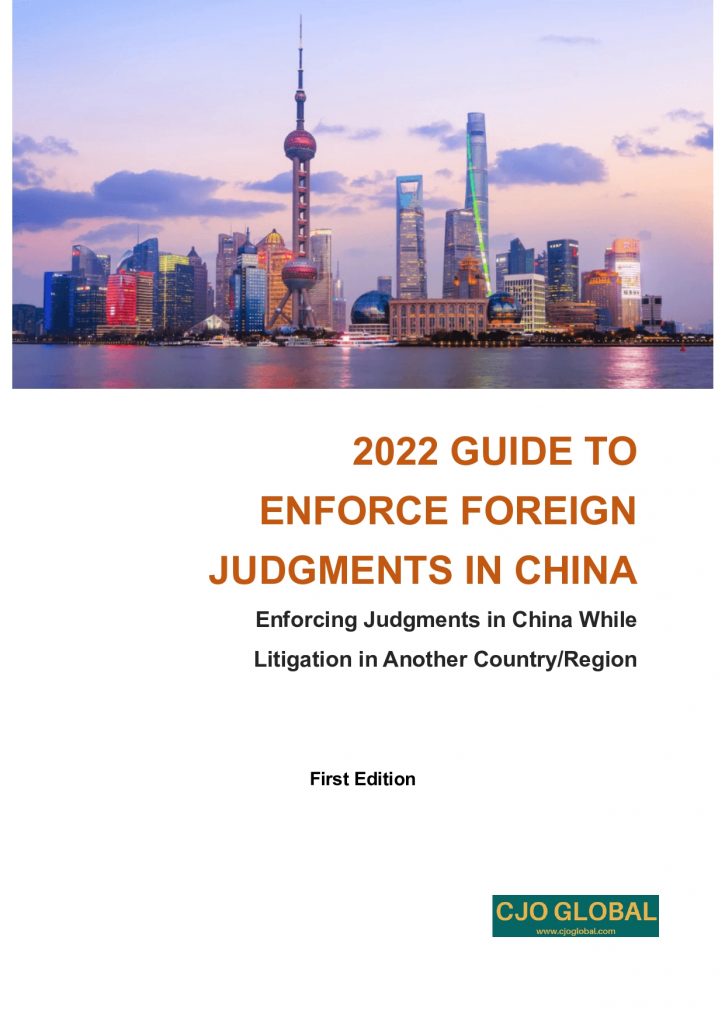2022 Guide to Enforce Foreign Judgments in China
Can I sue Chinese companies in a district court in California, the U.S., or in Paris, France, and then enforce a judgment in China from those courts?
Most likely, you don’t want to have to go so far away as to sue a Chinese company. You may just want to take your case in the court on your doorstep because you are more familiar with your home state.
However, you are also aware that most, if not all, of the assets of the Chinese company are located in China. As a result, even if you have won the lawsuit at home, you still need to have your judgment enforced in China.
Under Chinese law, you cannot enforce a judgment in China on your own initiative or through another agency. You will need to appoint a Chinese lawyer to assist you in applying to the Chinese courts for recognition of your judgment, and then for the Chinese courts to enforce your judgment.
This concerns the recognition and enforcement of foreign judgments in China.
China has adopted a more friendly attitude towards the enforcement of foreign judgments in China since 2015, with a handful of successful cases concerning the recognition of judgments of several countries, including the United States, Singapore, and South Korea.
On this basis, China’s Supreme People’s Court(SPC) started applying new rules in 2022, which ensure transparent and fair practices and procedures, thus enhancing predictability for creditors.
Therefore, you can feel confident to consider enforcing your judgments in China after 2022.
We have many years of professional experience in this field. You can read about our four years of observations in this field on our multi-author blog, China Justice Observer.
To help you have a clear and comprehensive idea of this topic, we’ve put together the following Q&A.
Please download the PDF version.
1. Which foreign judgments can be recognized and enforced in China?
Foreign civil and commercial judgments, civil compensation in criminal judgments, and bankruptcy judgments may be recognized and enforced in China.
However, the relevant judgments of intellectual property cases, unfair competition cases, and anti-monopoly cases will not be recognized and enforced in China due to the geographical attributes and particularity thereof.
2. Will Chinese courts recognize and enforce the judgments of my country’s courts?
Chinese courts will recognize and enforce your judgment if the country where your judgment was rendered has concluded an international or bilateral treaty with China on the recognition and enforcement of judgments.
China has signed, but not ratified, the Convention on Choice of Court Agreements. And China has not acceded to the Convention on the Recognition and Enforcement of Foreign Judgments in Civil or Commercial Matters (the “Hague Judgments Convention). However, to date, China and 39 States have concluded bilateral judicial assistance treaties, among which 35 bilateral treaties include the judgment enforcement clauses. The judgments of countries involved in the 35 bilateral treaties will be recognized and enforced in China. These countries include Algeria, Argentina, Belarus, Bosnia and Herzegovina, Brazil, Bulgaria, Cuba, Cyprus, Egypt, Ethiopia, France, Greece, Hungary, Iran, Italy, Kazakhstan, Kuwait, Kyrgyzstan, Laos, Lithuania, Mongolia, Morocco, North Korea, Peru, Poland, Romania, Russia, Spain, Tajikistan, Tunisia, Turkey, the UAE, Ukraine, Uzbekistan, and Vietnam.
Even if the country where your judgment was rendered is not included in the above list, Chinese courts will recognize and enforce your judgment if it has a reciprocal relationship with China for the recognition and enforcement of judgments.
So, which countries have a reciprocal relationship with China?
3. Which countries have established or are likely to establish reciprocal relationships with China?
Judgments of the following countries/regions have been recognized and enforced in China because Chinese courts believe there exist reciprocal relationships between these countries and China: Germany, Singapore, South Korea, USA, Australia, British Virgin Islands, Canada, Netherlands, New Zealand, and the UK.
Other countries may also be found by Chinese courts to have established reciprocal relationships with China, even though there are no actual cases to show the reciprocal relationships, if the following conditions are met:
(1) De jure reciprocity
If, according to the law of the country where the judgment is rendered, the Chinese civil and commercial judgments can be recognized and enforced by the court of that country, then the Chinese court will also recognize its judgments.
In March 2022, based on de jure reciprocity, the Shanghai Maritime Court of PRC issued a ruling to recognize and enforce an English commercial judgment (Spar Shipping AS v Grand China Logistics Holding (Group) Co., Ltd. (2018) Hu 72 Xie Wai Ren No.1).
(2) Reciprocal understanding or consensus
If there is a reciprocal understanding or consensus between China and the country where the judgment is rendered, then China can recognize and enforce the judgment of that country.
For instance, the SPC and the Supreme Court of Singapore signed a Memorandum of Guidance on Recognition and Enforcement of Money Judgments in Commercial Cases (the MOG) in 2018, confirming that Chinese courts can recognize and enforce Singaporean judgments on the basis of reciprocity.
The MOG is probably the first (and only so far) attempt by Chinese courts on “reciprocal understanding or consensus”. The MOG was first invoked by a Chinese court in Power Solar System Co., Ltd. v. Suntech Power Investment Pte. Ltd. (2019) Hu 01 Xie Wai Ren No.22, a case where a Singapore judgment was recognized and enforced in China.
(3) Reciprocal commitment without exception
If either China or the country where the judgment is rendered has made a reciprocal commitment through diplomatic channels, and the country where the judgment is rendered has not refused to recognize the Chinese judgment on the ground of lack of reciprocity, then the Chinese court can recognize and enforce the judgment of that country.
But so far, we haven’t found any country that has such a commitment to China.
4. If Chinese courts can recognize and enforce my judgments, how will the Chinese court review the judgment concerned?
Chinese courts usually do not conduct a substantive review on foreign judgments. In other words, Chinese courts would not examine whether foreign judgments make mistakes in fact-finding and application of law.
(1) Refusal of recognition and enforcement
Chinese courts will refuse to recognize the applicant’s foreign judgment under the following circumstances, specifically as follows:
i. In accordance with the law of the People’s Republic of China, the court that rendered the judgment has no jurisdiction over the case;
ii. The defendant did not receive proper notice of the judicial proceedings or have a reasonable opportunity to argue, or the incapacitated defendant did not receive appropriate representation in accordance with the law of the place where the judgment was rendered;
iii. The judgment is obtained by fraud or bribery;
iv. The court of the People’s Republic of China has rendered a judgment on the same dispute between the same parties, or has recognized the judgment of a third country in this regard;
v. Recognition and enforcement of the judgment concerned will violate the basic principles of the laws of the People’s Republic of China or the sovereignty, security, and public interests of the state.
vi. Where a foreign judgment awards damages, the amount of which significantly exceeds the actual loss, a people’s court may refuse to recognize and enforce the excess.
If a Chinese court refuses to recognize a foreign judgment on the grounds of the above, it will make a ruling refusing to recognize and enforce the foreign judgment. The ruling so made shall not be appealed.
(2) Dismissal of the application
If the foreign judgment temporarily does not meet the following requirements for
recognition and enforcement, the Chinese court will render a ruling to dismiss the
application. For example:
i. China has not entered into relevant international or bilateral treaties with the country where the judgment is rendered, and there is no reciprocal relationship between them;
ii. the foreign judgment has not yet entered into force;
iii. the application documents submitted by the applicant have not yet met the requirements of Chinese courts.
If the aforesaid circumstances are not found in your judgment, the Chinese courts will recognize and enforce the judgment.
5. When should I apply to China for recognition and enforcement of my judgments?
If you apply to Chinese courts for recognition of foreign judgments or for recognition and enforcement at the same time, you should apply to Chinese courts within two years.
The commencement of the two-year period can be divided into the following three situations:
(1) Where your judgment provides for the period of debt performance, it shall be counted from the last day of that period;
(2) Where your judgment provides for the debt performance by stages, it shall be counted from the last day of each performance period as stipulated;
(3) Where your judgment does not provide for a period of performance, it shall be counted from the date when the judgment takes effect.
If you apply to a Chinese court only for recognition of your judgment, the Chinese court will make a ruling recognizing this judgment. Thereafter, if you wish to apply to a Chinese court for enforcement of this judgment, you should apply to the Chinese court within two years. The two-year period shall be counted from the effective date of the ruling of the Chinese Court on recognition of this judgment.
6. Which court in China should I apply to for recognition and enforcement of my judgment?
You may apply to a Chinese intermediate court of the place where the respondent is located or where the property subject to execution is located for recognition and enforcement.
7. To apply to Chinese courts for recognition and enforcement of my judgment, do I have to pay the court fees?
Yes.
For the recognition or enforcement of foreign judgments in China, the average length of proceedings is 584 days, the court costs are no more than 1.35% of the amount in controversy or 500 CNY, and the attorney’s fees are, on average, 7.6% of the amount in controversy.
CJO GLOBAL‘s co-founders, Mr. Guodong Du and Ms. Meng Yu analyzed the time and cost of the recognition and enforcement of foreign judgments in China based on the cases they collected. For more information, please read our other post “Time and Expenses – Recognition and Enforcement of Foreign Judgments in China”.When you win the case, the court fee shall be borne by the respondent.
8. Can I seek interim measures against the respondent?
Yes.
Interim measures are commonly referred to as “conservatory measures” in China.
In terms of recognition and enforcement of judgments, conservatory measures refer to certain measures taken by the court against the respondent, upon application by the applicant, in cases where it may be difficult to enforce the future judgment for reasons attributable to the respondent.
Conservatory measures are critical in cases of judgment enforcement.
In China, it is not rare that the judgment debtor evades its judgment debt. Many judgment debtors will quickly transfer, hide, sell or damage their assets once they find that they may lose the case or be subject to property execution. This greatly reduces the reimbursement rate after the judgment creditor wins the case.
Therefore, in China’s civil litigation, many plaintiffs will immediately apply to the court for conservatory measures after (or even before) filing an action, and so is the case when they apply to the court for judgment enforcement, with an aim to control the property of the judgment debtor as soon as possible.
9. When I apply to Chinese courts for recognition and enforcement of my judgment, what materials should I submit?
You need to submit the following materials:
(1) The Application Form;
(2) The applicant’s identity certificate or business registration certificate (if the applicant is a corporate body, the identity certificate of the authorized representative or
the person in charge of the applicant must also be provided);
(3) The Power of Attorney (authorizing lawyers to act as agents ad litem);
(4) The original judgment and a certified copy thereof;
(5) Documents proving that the judgment has become legally effective, unless otherwise stated in the judgment;
(6) Documents proving that the defaulting party has been duly summoned in case of a default judgment, unless otherwise stated in the judgment; and
(7) Documents proving that an incapacitated person has been properly represented, unless otherwise stated in the judgment.
If the aforementioned materials are not in Chinese, then you also need to provide the Chinese translation of these materials. The official seal of the translation agency shall be affixed to the Chinese version. In China, some courts only accept Chinese translations provided by agencies listed in their lists of translation agencies, while others do not.
Documents from outside China must be notarized by local notaries in the country where such documents are located and certified by local Chinese consulates or Chinese embassies.
10. What should be included in the Application Form?
In the Application Form, you need to give a brief description of the matter you are
applying for. In addition, you can also discuss the main points in which Chinese courts are interested during examining the recognition and enforcement of foreign judgments. Generally speaking, the contents of the Application Form may include:
(1) A brief statement of the judgment, including the name of the foreign court, the case number, the commencement date of the proceeding, and the date of the judgment;
(2) Issues to be enforced by Chinese courts;
(3) The performance of the respondent and the enforcement thereto outside China;
(4) The specific property of the respondent to be enforced by Chinese courts (which can facilitate Chinese courts to identify the property of the respondent available for enforcement);
(5) Proving that your country and China have concluded international treaties on recognition and enforcement of foreign judgments, or have formed a reciprocal relationship;
(6) Proving that the judgment concerned falls into the type of foreign judgments recognizable and enforceable by Chinese courts;
(7) Proving that the court that rendered the judgment has jurisdiction over the case, and that Chinese courts have no compulsory jurisdiction over the case under Chinese law;
(8) Proving that the original court has reasonably summoned the respondent;
(9) Proving that the original judgment or ruling is final, including its reasonable service to the respondent.
Do you need support in cross-border trade and debt collection? CJO Global's team can provide you with China-related cross-border trade risk management and debt collection services, including: (1) Trade Dispute Resolution (2) Debt Collection (3) Judgments and Awards Collection (4) Anti-Counterfeiting & IP Protection (5) Company Verification and Due Diligence (6) Trade Contract Drafting and Review If you need our services, or if you wish to share your story, you can contact our Client Manager: Susan Li (susan.li@yuanddu.com). If you want to know more about CJO Global, please click here. If you want to know more about CJO Global services, please click here. If you wish to read more CJO Global posts, please click here.

Photo by Jéan Béller on Unsplash









Pingback: Is It Possible to Collect Debt from China If the Debtor Has Assets There? - CJO GLOBAL
Pingback: How to Successfully Collect Debts in China - CJO GLOBAL
Pingback: One Minute Guide to China’s Civil Litigation - CJO GLOBAL
Pingback: How to Get Refund From Chinese Company? - CJO GLOBAL
Pingback: Investors of China's Bonds: Go Ahead and Sue As Your Foreign Court Judgement Can Be Enforced in China - CJO GLOBAL